|
|
|
Sort Order |
|
|
|
Items / Page
|
|
|
|
|
|
|
| Srl | Item |
| 1 |
ID:
117109
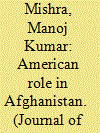

|
|
|
| 2 |
ID:
131594
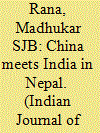

|
|
|
|
|
| Publication |
2013.
|
| Summary/Abstract |
This article attempts to conduct a comprehensive assessment of India and China's interests in Nepal in the wake of the drastic political Nepal since 2006. In this regard, the '6C- Frame of 1 as been employed in the context of Nepal, viz, 1) What are : interests of China and India?; it) What are their conflicting I) What are the areas of cooperation," (iv) What are the areas ' v) How do they diplomatically communicate their T vi) How do they diplomatically coordinate their interests cooperation and minimize con?ict?
|
|
|
|
|
|
|
|
|
|
|
|
|
|
|
|
| 3 |
ID:
133890
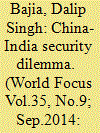

|
|
|
|
|
| Publication |
2014.
|
| Summary/Abstract |
China and India remain locked in a stagnant embrace when it comes to the most intractable of security dilemmas: the Sino-Indian border issue. A closer look at Chinese and Indian strategic, scientific and academic experts' security perceptions vis-a-vis one another reveals that there is mueh more to the Sino-Indian security dynamic than meets the eye. Chinese and Indian strategic analysts hold divergent interests when evaluating each other's military modernization, the former preoccupied with India's naval development and the latter with China's army. Technical analysts in each country share a similar level of interest in the other's aviation and aerospace programs.
|
|
|
|
|
|
|
|
|
|
|
|
|
|
|
|
| 4 |
ID:
133894
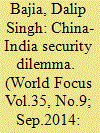

|
|
|
|
|
| Publication |
2014.
|
| Summary/Abstract |
China and India remain locked in a stagnant embrace when it comes to the most intractable of security dilemmas: the Sino-Indian border issue. A closer look at Chinese and Indian strategic, scientific and academic experts' security perceptions vis-a-vis one another reveals that there is mueh more to the Sino-Indian security dynamic than meets the eye. Chinese and Indian strategic analysts hold divergent interests when evaluating each other's military modernization, the former preoccupied with India's naval development and the latter with China's army. Technical analysts in each country share a similar level of interest in the other's aviation and aerospace programs.
|
|
|
|
|
|
|
|
|
|
|
|
|
|
|
|
| 5 |
ID:
133389
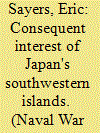

|
|
|
|
|
| Publication |
2014.
|
| Summary/Abstract |
In his classic collection of essays on maritime geography The Interest of America in Sea Power, Present and Future, Alfred Thayer Mahan opined that the importance of "portions of the earth's surface, and their consequent interest to mankind, differ from time to time."1 Just as the Mediterranean Sea once transfixed the minds of European strategists and policy makers, Mahan believed, at the turn of the twentieth century, the Gulf of Mexico and Caribbean Sea would obtain similar prominence in American strategic thinking. A century later, as we observe the relative balance of economic and military powers shifting to Asia and the Pacific and Indian Oceans, Mahan's teachings on geography are again instructive, as once seemingly insignificant bodies of water and island chains take on a new importance in regional security matters.
|
|
|
|
|
|
|
|
|
|
|
|
|
|
|
|
| 6 |
ID:
129430
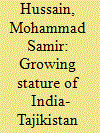

|
|
|
|
|
| Publication |
2014.
|
| Summary/Abstract |
'Tajikistan is a key partner of India in the Central Asian region' - Indian Prime Minister, Manmohan Singh, September 2012
The end of the Cold War, witnessed a dramatic transformation in the world order. India has concluded strategic partnership agreements with various regional and global partners such as the United States, Russia, France, Japan, Kazakhstan, Afghanistan, Uzbekistan etc. Tajikistan became the latest country to have concluded the strategic partnership agreement with India and the third among the Central Asian Republics (CARs) after Kazakhstan and Uzbekistan. The post-Cold War global strategic developments have brought India and Tajikistan closer to one another. Strategic partnership agreement makes a lot of sense when Tajikistan is considered India's gateway to Central Asia. Strategic partnership agreement is part of India's foreign policy goals to strengthen its presence in areas of interest to India and gaining
more strategic space. The agreement was signed during the visit of the President of the Republic of Tajikistan, Emomali Rahmon to India in September 2012. It was important in a way that it elevated the old close normal bilateral ties to strategic level. With this, both sides can now engage in a robust manner. The strategic importance of this partnership lies in sharing common perspectives on several international
and regional issues. In the 21st century, both sides would like to establish qualitatively new and mutually beneficial relations in the political, economic, military, development cooperation and in other areas.
|
|
|
|
|
|
|
|
|
|
|
|
|
|
|
|
| 7 |
ID:
133605
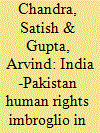

|
|
|
|
|
| Publication |
2014.
|
| Summary/Abstract |
It is relevant to recall the background to Pakistan's move to introduce this resolution. India was in a very difficult situation at the time. Kashmir was in flames due to a strong militant movement aided and abetted by Pakistan. Confrontation between the security forces and militants was an all too frequent occurrence. Moreover, India was far from being a rising power as is the case today. It had a minority government fighting for survival, hard put to address a myriad of serious problems like the demolition of the Babri Masjid and the subsequent Mumbai riots with an economy on the brink of bankruptcy. You would remember that a couple of years earlier, we had to mortgage gold to keep our economy afloat and India's diplomatic standing was, perhaps, at its lowest ever at that point in time. With hindsight, it is obvious that Pakistan had orchestrated its move to mount a resolution against us on Kashmir in tandem with its promotion of militancy there, so as to internationalise the issue and push us to the corner at a time when we were at our weakest.
|
|
|
|
|
|
|
|
|
|
|
|
|
|
|
|
| 8 |
ID:
133495
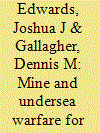

|
|
|
|
|
| Publication |
2014.
|
| Summary/Abstract |
A resurgent regional power in the Pacific has grown successively more aggressive in territorial claims to a number of disputed island groups. Unilaterally establishing air-defense identification zones and stoking nationalistic feelings among its population have spiked international tensions in the region as other nations resist this aggressive behavior. In this powder-keg situation, a tactical miscalculation on the part of one aggressor ship skipper results in a collision between opposing warships. Both countries begin mobilizing for war.
|
|
|
|
|
|
|
|
|
|
|
|
|
|
|
|
| 9 |
ID:
131434
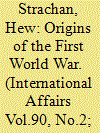

|
|
|
|
|
| Publication |
2014.
|
| Summary/Abstract |
The recent crop of books on the origins of the First World War dispenses with the notion of inevitability in the outbreak of war, and stresses the maturity of European civilization in 1914. They are in danger of prioritizing urban life over rural, civilization and culture over backwardness and superstition. They also say less than they might about the enduring place of war in international relations. The stress on contingency is to be welcomed for getting history away from the determinism of long-term trends, and for reopening the uncertainty of the outcomes still open to the Great Powers in 1914. However, the overall effect is cyclical. The prevailing wisdom on the reasons for war has reverted to the argument that 'Europe slithered over the brink', which dominated from the 1930s until the publications of Fritz Fischer in the 1960s. This does not mean that 'Fischerism', with its belief in German war guilt, is extinct. The challenge which now confronts historians, as they approach a four-year centenary, is to break this circularity and to explore new paths.
|
|
|
|
|
|
|
|
|
|
|
|
|
|
|
|
| 10 |
ID:
128113
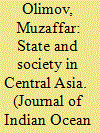

|
|
|
|
|
| Publication |
2013.
|
| Summary/Abstract |
Along with path breaking developments in Eurasia in recent decades, central Asian countries have seen changes in position, identity and orientation of previously isolated countries lying in the heart of Eurasia. Although central Asian countries were previously oriented towards North, now they have turned their attention to the South and East. integration into the international transportation network, construction of new roads, bridges and tunnels, growth of international trade, transport and migration have sharply increased their levels of interaction with the world and especially with neighbors in Eurasia and South Asia, including India.
|
|
|
|
|
|
|
|
|
|
|
|
|
|
|
|
|
|
|
|
|